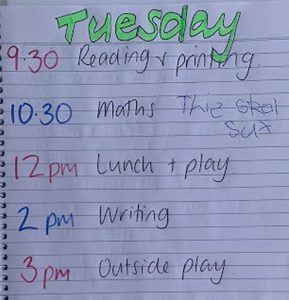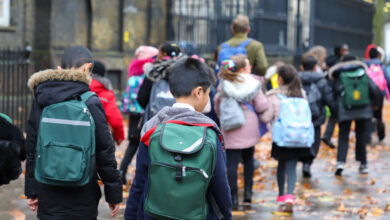So… you’re the teacher now? Tips and strategies for whānau navigating learning at home
Last week my Facebook feed was inundated with whānau who have recently found themselves teaching from home.

Lots of questions about what offences constitute giving out detentions, what’s the magic tonic to make my kids listen, and desperate pleas for Suzy Cato’s phone number. It’s given me lots of giggles, however I have sensed the subtle yelps for help in between the banter. A recent post on Facebook from a friend resulted in a flurry of comments from parents who are all asking the same question in many different ways. “How am I supposed to be my kids’ teacher?”
So here’s the answer you are so desperately seeking – it’s all good, you’re not. At least you’re not expected to be a ‘teacher’ in the sense of the profession. You have always been your child’s teacher in life though and that’s the lifelong gig you signed up for. Despite the fact that our tamariki are now engaging in school work from home, your job is unchanged. You’re still their life coach, cheerleader and chief snack engineer. Put simply, you’ve got this learning at home lark in the bag, you’ve been holding this down since ages ago!
So I’m going to bust some myths and answer some FAQs for all the whānau out there navigating these new waters, and I’ll also suggest some tips and strategies that might help. My hope is that your kids’ teachers have stumbled across this blog and decided that it’s worth sharing with their community. If you find some ‘real talk’ in this blog that helps, please feel free to share it with your mates over those virtual coffee dates you’re having to maintain sanity.
Myth: I need to teach my kids from home during lockdown
No you don’t. You need to parent during lockdown. Parenting will include a tonne of different things that will undoubtedly include teaching your kids some stuff about some stuff. But please be clear, you do not have to sit down at night and teach yourself the correct terms for each part of a plant so you can on-teach this to your kids the next day. That’s why we were blessed with YouTube!
Learning happens all day, everyday and as parents you are already well-versed in the art of ‘teaching.’ All children have self-regulated skills, and they vary according to their age and abilities. As a parent your approach to this period of learning from home might be to identify those self-regulated skills and support your tamariki to strengthen them and develop new ones. This is the perfect time to support your kids to tie their own shoes, make a cake, build a bridge from straws, learn how to budget, or change the tyre on your bike.
“As for the position or expectations our school is taking, it is all about empowering our parents and guardians to make the best decision for their children during this time. You can pick and choose from the learning tasks our teachers have prepared. You can decide how much time they spend online or offline and ultimately, the priority for us all should be ensuring the wellbeing of tamariki during these uncertain times. Please don’t feel pressured in any way to do set tasks or set hours – our teachers are here to help if needed but you decide what is possible and what works best for you and your children in your own home.” – Tamara Bell, Principal of Southbridge School (source)
FAQ 1 – Does my child behave like this in class?
The answer to this varies but generally, no. I had my son in my class for a year once, and I can honestly say it was the hardest year of my teaching career. During the very silent car rides home each day I would be constantly asking myself that very question.
In a classroom teachers have the advantage of being able to create opportunities for social influence to engage students in learning. Put simply, if we can get a good number of students engaged in a task, others often get swept up in the momentum. We’ve all seen that video of the lone guy dancing and how slowly but surely others join him until everyone is dancing. That same practice can be an effective teaching strategy but it’s near impossible to employ this at home where your own kids can simply choose not to dance with you!
My (unburdened by research) theory on this stems back to when our kids are babies and one of their first words is often no. As parents we laugh at this mostly because they’re so cute when they shake their little heads and say no to us. Could this be the root cause for our kids non-conforming behaviour? They’re simply trying to be cute! Truth exposed: it’s 100x harder to teach your own kids than it is to teach others, so go easy on yourself.
FAQ 2 – How do I get my child to do their school work when they don’t want to?
If your child’s teacher has set work for them to engage in at home then some kids will be over the moon about it and will work through each task methodically and eagerly. Others will react like you’ve just asked them to chew off their own arm and eat it for breakfast. For those kids, school work belongs at school and home is where I get to engage in the things I love doing – combining the two worlds is simply unthinkable.
Deploying a learning by stealth strategy is going to be necessary here, and I’ll share some ideas for this soon. The most important thing to remember is that nothing is worth risking the wellbeing and happiness in your home, especially at this time. If your kids don’t want to do any school work at all despite your constant best efforts, then just don’t make them do it. Trust me, learning will happen everyday and you can make sure of this while deploying some learning by stealth strategies.
Myth: My kids will fall behind if they don’t do their school work at home
Not engaging in the school work set for your kids will not have an irreversible and hugely detrimental impact on the rest of their lives. Plenty of kids miss school and formal education for long periods of time perhaps to go travelling with their whānau where they learn heaps about life, people culture and relationships.
Each child’s learning song is unique. Each has its own genre, lyrics, beat and rhythm. It takes a lifetime to craft your own song and no songs are the same. If your kids do absolutely no formal learning during lockdown, they’ll be just fine in the big scheme of life. So take a deep breath, kick back and just enjoy the latest rendition of your child’s song and find joy in how they rock out!
Dear Parents,
Don’t stress about schoolwork. In September, I will get your children back on track. I am a teacher and that’s my superpower. What I can’t fix is social-emotional trauma that prevents the brain from learning. So right now, I just need you to share your calm, share your strength, and share your laughter with your children. No kids are ahead. No kids are behind. Your children are exactly where they need to be.
With love,
All the teachers on planet Earth
Written by Maria Karaiskos (source)
Teaching and learning in stealth mode
It might surprise you to know this but you already do this, daily. In essence this requires your tamariki to be engaging in the things they would normally engage in at home, and you slipping in some learning by stealth! Sort of like how you hide the veges in their dinner! Here’s how:
- Give them a challenge that relates to their interests and passions.
- Ask them to: plan, problem solve, do some learning or research, create, test, reflect, modify.
- Ask them to share their learning in creative and engaging ways: discussion, presentation for the whānau, powerpoint, video clip, interview.
- Ask questions to deepen their understanding and help them to reflect on their learning:
- Why did you decide to… What would happen if…. How did you learn about….
- How could you modify this to work for someone that was physically impaired?
- What would you do differently next time? Are there any improvements you’d like to make?
- Did you encounter any challenges or problems?
Here are some examples of learning activities by stealth. The idea is to create your own based on your child’s strengths and interests as well as what can be done practically in your home.
| Activities | Some learning by stealth suggestions |
| Lego |
|
| Cooking |
|
| Outside play |
|
| Physical Activity |
|
“Remember too that you are not expected to replicate the classroom in the home. Your teachers cannot possibly achieve that, and parents and caregivers are not trained teachers. The number one goal of schooling currently is to nurture wellbeing. Just as we know the value of strong relationships for successful learning and teaching, use this opportunity to help families nurture productive and supportive relationships in the home. Try to make learning opportunities creative and based on the experience of being in the home.” – Perry Rush, President of the New Zealand Principals Federation (source)
Tips and strategies that might help
Some kids will be struggling with this learning at home routine. They may even be quite disgruntled by the whole thing, and resist any kind of learning. My son found it challenging to engage in learning at school so I know I would’ve had an uphill battle getting him to do schoolwork at home during a lockdown period!
 There are some strategies that teachers employ that help to ensure no one gets left out of learning. If you’re finding your learning at home routine is not going as well as you’d hoped, here are some things to try:
There are some strategies that teachers employ that help to ensure no one gets left out of learning. If you’re finding your learning at home routine is not going as well as you’d hoped, here are some things to try:
- Choices: some kids just want to be master and commander of their own lives and so choices might work well here. Perhaps showing them a list of five tasks and asking them which two they’d like to do today. Asking them to write their own daily timetable that must include 1 to 2 tasks from the list but can also include snack time, TV time, device time etc.
- Go with what you know they love. If they’re into rugby then rugby theme everything! Whatever their strengths and passions are, create learning opportunities around them.
- For the energiser bunnies, the more physical activity you can engage them in on a daily basis, the better their temperament will be so create some physical challenges for them to complete.
- Just don’t sweat it. If your tamariki are open and willing to learn then great, if they’re not, that’s fine too. The happiness in your home and your relationship with your child is the most important thing. Nothing is worth fighting with your child over. Negotiate what they’re happy to do and what you’re happy to live with.
These are unprecedented times and the social, emotional and physical wellbeing of our tamariki is more important now than ever before. Many of us will be operating simply on survival mode and just getting through each day. Planning and delivering formal educational programmes for our kids may just not be high on the priority list right now and that’s o.k. Just know that what you do each and every day as parents is more than enough.
You taught them to walk and talk and tie their shoes – you know how to be their teacher. What they need right now is reassurance, love and security. We’ve been blessed with an opportunity to be with our kids 24/7 at the moment. Despite the challenges that come with that, it will be something we will come to cherish in years to come. Do what you can do and most of all prioritise a happy home, time to laugh, time to play and time to be together.
“You are that painter. You make the judgement about how the brush strokes land as you sweep them across the paper; you decide the colours; and you build your creation in a unique way because it is your work.” Perry Rush – President of the New Zealand Principals Federation (source)

“Each child’s learning song is unique. Each has its own genre, lyrics, beat and rhythm. It takes a lifetime to craft your own song and no song is the same. Kick back and just enjoy the latest rendition of your child’s song and find joy in how they rock out!” – Janelle Riki-Waaka
Author:  Janelle Riki-Waaka is a highly experienced leader and consultant at CORE Education specialising in areas such as developing cultural competencies, Te Tiriti o Waitangi education and digital technologies. With more than 8 years experience in developing and delivering effective professional learning solutions, Janelle has become highly regarded in these fields and sought after to support the professional learning journeys of educational contexts and more recently, some corporate organisations and government entities.
Janelle Riki-Waaka is a highly experienced leader and consultant at CORE Education specialising in areas such as developing cultural competencies, Te Tiriti o Waitangi education and digital technologies. With more than 8 years experience in developing and delivering effective professional learning solutions, Janelle has become highly regarded in these fields and sought after to support the professional learning journeys of educational contexts and more recently, some corporate organisations and government entities.









